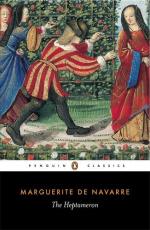Whilst tending her dying husband, Margaret was also deeply concerned as to the fate of her captive brother, for whom she always evinced the warmest affection. Indeed, so close were the ties uniting Louise of Savoy and her two children that they were habitually called the “Trinity,” as Clement Marot and Margaret have recorded in their poems. (2)
1 From a MS. poem in
the Bibliotheque Nationale entitled
Les Prisons,
probably written by William Philander or
Filandrier, a canon
of Rodez.
2 See OEuvres de
Clement Marot, 1731, vol. v. p. 274; and
A. Champoilion-Figeac’s
Poesies de Francois Ier, &c.,
Paris, 1847, p. 80.
In this Trinity Francis occupied the highest place; his mother called him “her Caesar and triumphant hero,” while his sister absolutely reverenced him, and was ever ready to do his bidding. Thus the intelligence that he was wounded and a prisoner threw them into consternation, and they were yet undecided how to act when they received that famous epistle in which Francis wrote—not the legendary words, “All is lost save honour,” but—“Of all things there have remained to me but honour and life, which is safe.” After begging his mother and sister to face the extremity by employing their customary prudence, the King commended his children to their care, and expressed the hope that God would not abandon him. (1) This missive revived the courage of the Regent and Margaret, for shortly afterwards we find the latter writing to Francis: “Your letter has had such effect upon the health of Madame [Louise], and of all those who love you, that it has been to us as a Holy Ghost after the agony of the Passion.... Madame has felt so great a renewal of strength, that whilst day and evening last not a moment is lost over your business, so that you need have no grief or care about your kingdom and children.” (2)
1 See extract from the Registers of the Parliament of Paris (Nov. 10, 1525) in Dulaure’s Histoire de Paris, Paris, 1837, vol. iii. p. 209; and Lalanne’s Journal d’un Bourgeois de Paris, Paris, 1854, p. 234. The original of the letter no longer exists, but the authenticity of the text cannot be disputed, as all the more essential portions are quoted in the collective reply of Margaret and Louise of Savoy, which is still extant. See Champollion-Figeac’s Captivite de Francois Ier, pp. 129, 130.
2 Genin’s Nouvelles
Lettres de la Peine de Navarre,
Paris, 1842, p. 27.
Louise of Savoy was indeed now displaying courage and ability. News shortly arrived that the King had been transferred to Madrid, and that Charles demanded most onerous conditions for the release of his prisoner. At this juncture Francis wrote to his mother that he was very ill, and begged of her to come to him. Louise, however, felt that she ought not to accede to this request, for it would be jeopardising the monarchy to place the Regent as well as the King of France in the Emperor’s hands; accordingly she resolved that Margaret should go instead of herself.




